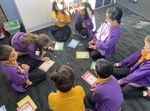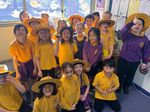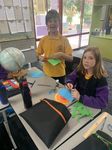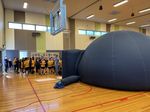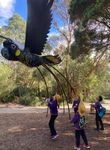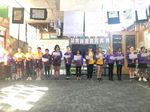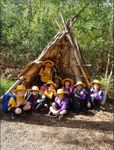7 May 2021 - Ruskin Park Primary School
←
→
Page content transcription
If your browser does not render page correctly, please read the page content below
Upcoming Dates
May June
th
Tuesday 11 Toastmasters commences Year 6 Tuesday 1st Division Cross Country
Zoo Excursion Year 1 Thursday 4th 5/6 Sport Gala Day
NAPLAN Window Opens
Friday 14th District Cross Country Monday 14th Queen’s Birthday Public Holiday
Sunday 16th Bunnings Sausage Sizzle Friday 18th Reports Live on Compass
Monday 17th School Council Monday 21st Parent Teacher Interviews
Wednesday 19th Zoo Excursion Foundation School Council
Wednesday 23rd Parent Teacher Interviews
th
Friday 28 Curriculum Day Friday 25th End of Term 2- 2:30pm dismissal
Principal’s Report
Professional Learning
In recent years we have partnered with consultant Danny Hyndman, who has supported us as we strive to refine and
further improve our reading program. Over the past fortnight, Danny has again returned to Ruskin Park and led our
staff through some rich professional learning. He has worked closely with sub school teams, completing
demonstration lessons, facilitating and guiding professional discussions and leading whole staff sessions.
While the sessions with Danny have been highly engaging and affirming, they have also supported us to identify
opportunities to grow and further develop. There is currently a significant focus on formative assessment, where we
use a variety of data sources to ensure we identify every student’s individual learning needs and extend them
accordingly. This is not just a pre-test prior to commencing a unit, but also the monitoring of learning as the unit
progresses.
It continues to be an exciting and rewarding journey.
Mother’s Day Stall
The Mother’s Day stall is always a special event with students enjoying the
opportunity to go ‘shopping’ and search for that perfect gift. We were not able
to hold the store last year, so excitement was high with its return.
The stall would not be possible without the support of our wonderful Family
and Friends Network. Many hours were spent planning, purchasing and
supervising the stall and we thank everyone involved for their contribution.Building Update In recent months there have been a number of meetings with architects and the Department as we plan for Stage 1 of our building works. I will hopefully be in a position to share some plans with our community in the very near future. School Council have recently endorsed the schematic design. This will involve the replacement of our current Foundation building. The new building is likely to be double story and include additional classrooms, a new art room and outdoor learning space. Classrooms will be flexible, with the ability to be individual rooms but also to become more open with some adjustable walls. There will be central foyers and collaborative work spaces where classes and groups can come together. We are still on track for works to commence by the end of this year. Feedback from staff and also school council has been incredibly positive. It is an exciting time. New Laptops We are continuing to replace and systematically upgrade our school equipment. As part of this process, we took delivery of 80 new laptops that will be located in our Senior School. I am sure our students will enjoy using the new technology. 2020 Annual Report Schools are required to have their annual reports completed and endorsed by school council before the end of April. Our report is again incredibly pleasing and testament to the hard work by students and staff along with the support provided by our families. We are ahead of State and ‘Similar School’ averages in all areas. I have included below some of the graphs and tables.
Andrew Moore Principal Assistant Principal I have included an article below that was sent to me by a colleague. Personally, it resonated with some of the emotions myself and friends have experienced at times through the pandemic. I thought it was worth sharing in the hope it may be of benefit to some of our families. It is a long article, but it does make sense. Have a great fortnight! Shannon Young Assistant Principal There’s a Name for the Blah You’re Feeling: It’s Called Languishing The neglected middle child of mental health can dull your motivation and focus — and it may be the dominant emotion of 2021.
Credit...Manshen Lo By Adam Grant Published April 19, 2021Updated April 22, 2021 At first, I didn’t recognize the symptoms that we all had in common. Friends mentioned that they were having trouble concentrating. Colleagues reported that even with vaccines on the horizon, they weren’t excited about 2021. A family member was staying up late to watch “National Treasure” again even though she knows the movie by heart. And instead of bouncing out of bed at 6 a.m., I was lying there until 7, playing Words with Friends. It wasn’t burnout — we still had energy. It wasn’t depression — we didn’t feel hopeless. We just felt somewhat joyless and aimless. It turns out there’s a name for that: languishing. Languishing is a sense of stagnation and emptiness. It feels as if you’re muddling through your days, looking at your life through a foggy windshield. And it might be the dominant emotion of 2021. As scientists and physicians work to treat and cure the physical symptoms of long-haul Covid, many people are struggling with the emotional long-haul of the pandemic. It hit some of us unprepared as the intense fear and grief of last year faded. In the early, uncertain days of the pandemic, it’s likely that your brain’s threat detection system — called the amygdala — was on high alert for fight-or-flight. As you learned that masks helped protect
us — but package-scrubbing didn’t — you probably developed routines that eased your sense of dread. But the pandemic has dragged on, and the acute state of anguish has given way to a chronic condition of languish. In psychology, we think about mental health on a spectrum from depression to flourishing. Flourishing is the peak of well-being: You have a strong sense of meaning, mastery and mattering to others. Depression is the valley of ill-being: You feel despondent, drained and worthless. Languishing is the neglected middle child of mental health. It’s the void between depression and flourishing — the absence of well-being. You don’t have symptoms of mental illness, but you’re not the picture of mental health either. You’re not functioning at full capacity. Languishing dulls your motivation, disrupts your ability to focus, and triples the odds that you’ll cut back on work. It appears to be more common than major depression — and in some ways it may be a bigger risk factor for mental illness. The term was coined by a sociologist named Corey Keyes, who was struck that many people who weren’t depressed also weren’t thriving. His research suggests that the people most likely to experience major depression and anxiety disorders in the next decade aren’t the ones with those symptoms today. They’re the people who are languishing right now. And new evidence from pandemic health care workers in Italy shows that those who were languishing in the spring of 2020 were three times more likely than their peers to be diagnosed with post-traumatic stress disorder. Part of the danger is that when you’re languishing, you might not notice the dulling of delight or the dwindling of drive. You don’t catch yourself slipping slowly into solitude; you’re indifferent to your indifference. When you can’t see your own suffering, you don’t seek help or even do much to help yourself. Even if you’re not languishing, you probably know people who are. Understanding it better can help you help them. A name for what you’re feeling Psychologists find that one of the best strategies for managing emotions is to name them. Last spring, during the acute anguish of the pandemic, the most viral post in the history of Harvard Business Review was an article describing our collective discomfort as grief. Along with the loss of loved ones, we were mourning the loss of normalcy. “Grief.” It gave us a familiar vocabulary to understand what had felt like an unfamiliar experience. Although we hadn’t faced a pandemic before, most of us had faced loss. It helped us crystallize lessons from our own past resilience — and gain confidence in our ability to face present adversity. We still have a lot to learn about what causes languishing and how to cure it, but naming it might be a first step. It could help to defog our vision, giving us a clearer window into what had been a blurry experience. It could remind us that we aren’t alone: languishing is common and shared. And it could give us a socially acceptable response to “How are you?” Instead of saying “Great!” or “Fine,” imagine if we answered, “Honestly, I’m languishing.” It would be a refreshing foil for toxic positivity — that quintessentially American pressure to be upbeat at all times. When you add languishing to your lexicon, you start to notice it all around you. It shows up when you feel let down by your short afternoon walk. It’s in your kids’ voices when you ask how online school went. It’s in “The Simpsons” every time a character says, “Meh.”
Last summer, the journalist Daphne K. Lee tweeted about a Chinese expression that translates to “revenge bedtime procrastination.” She described it as staying up late at night to reclaim the freedom we’ve missed during the day. I’ve started to wonder if it’s not so much retaliation against a loss of control as an act of quiet defiance against languishing. It’s a search for bliss in a bleak day, connection in a lonely week, or purpose in a perpetual pandemic. An antidote to languishing So what can we do about it? A concept called “flow” may be an antidote to languishing. Flow is that elusive state of absorption in a meaningful challenge or a momentary bond, where your sense of time, place and self melts away. During the early days of the pandemic, the best predictor of well-being wasn’t optimism or mindfulness — it was flow. People who became more immersed in their projects managed to avoid languishing and maintained their prepandemic happiness. An early-morning word game catapults me into flow. A late-night Netflix binge sometimes does the trick too — it transports you into a story where you feel attached to the characters and concerned for their welfare. While finding new challenges, enjoyable experiences and meaningful work are all possible remedies to languishing, it’s hard to find flow when you can’t focus. This was a problem long before the pandemic, when people were habitually checking email 74 times a day and switching tasks every 10 minutes. In the past year, many of us also have been struggling with interruptions from kids around the house, colleagues around the world, and bosses around the clock. Meh. Fragmented attention is an enemy of engagement and excellence. In a group of 100 people, only two or three will even be capable of driving and memorizing information at the same time without their performance suffering on one or both tasks. Computers may be made for parallel processing, but humans are better off serial processing. Give yourself some uninterrupted time That means we need to set boundaries. Years ago, a Fortune 500 software company in India tested a simple policy: no interruptions Tuesday, Thursday and Friday before noon. When engineers managed the boundary themselves, 47 percent had above-average productivity. But when the company set quiet time as official policy, 65 percent achieved above-average productivity. Getting more done wasn’t just good for performance at work: We now know that the most important factor in daily joy and motivation is a sense of progress. I don’t think there’s anything magical about Tuesday, Thursday and Friday before noon. The lesson of this simple idea is to treat uninterrupted blocks of time as treasures to guard. It clears out constant distractions and gives us the freedom to focus. We can find solace in experiences that capture our full attention. Focus on a small goal The pandemic was a big loss. To transcend languishing, try starting with small wins, like the tiny triumph of figuring out a whodunit or the rush of playing a seven-letter word. One of the clearest paths to flow is a just-manageable difficulty: a challenge that stretches your skills and heightens your resolve. That means carving out daily time to focus on a challenge that matters to you — an interesting project, a worthwhile goal, a meaningful conversation. Sometimes it’s a small step toward rediscovering some of the energy and enthusiasm that you’ve missed during all these months.
Languishing is not merely in our heads — it’s in our circumstances. You can’t heal a sick culture with personal bandages. We still live in a world that normalizes physical health challenges but stigmatizes mental health challenges. As we head into a new post-pandemic reality, it’s time to rethink our understanding of mental health and well-being. “Not depressed” doesn’t mean you’re not struggling. “Not burned out” doesn’t mean you’re fired up. By acknowledging that so many of us are languishing, we can start giving voice to quiet despair and lighting a path out of the void. Adam Grant is an organizational psychologist at Wharton, the author of “Think Again: The Power of Knowing What You Don’t Know” and the host of the TED podcast WorkLife. Foundation Firstly, Happy Mother`s Day for this weekend. Your children have been busy making you a `special little something`. We hope you have a lovely day. Reading Our big focus for reading at the moment is to read Just Right books. We have been thinking carefully about our book choices, why we`re choosing them and discussing the content of them. The students are becoming more familiar with identifying fiction and non-fiction books. Ask them to tell you some of the features of a non-fiction text. We are so proud of them. Writing We now have several writing goals that we`ve worked on since starting school. Writing is such a difficult skill to master and remembering and persevering with these goals is helping us to have more success with our writing. • Using a correct pencil grip • Sounding out words • Using finger spaces • Using a letter chart • Using a sight word chart • Remembering full stops • Sitting the letters on the line We are using these skills to write Non-Fiction texts, linking to the reading work. We have been drawing diagrams and writing labels to go with them as well as writing basic facts about living things. Sounds We are continuing to look at two new letters each week. For the first half of this term we are focusing on H, B, F, L, J, V, W, X, Y and Z. Have a look around your house for objects that start with these letters. We are learning how to hear and record these sounds in words as well as practising the correct handwriting posture, pencil grip and letter formation. Maths We`ve just completed two weeks of ‘Pattern’ in Maths and have now shifted to a focus on ‘Time Duration’. We are learning the days of the week in order and are thinking about different things that happen on these days. Along with singing, reading and sorting the days, we`ve been working on day and night also. We`ve been identifying, describing and sorting events that happen at these times.
Rotations This is our second week of rotations. All the Foundation students get an afternoon with each of the Foundation teachers to explore Library, ICT and Music. It`s great to work with the whole cohort and get to know students in the other classes. Please remember to send your child with their Library bag on the following days so they can return and select a new library book. Tuesday- Mrs Dickinson`s class- FD Wednesday- Miss Doenson`s class- FA Thursday- Mrs Tozer`s class- FT Zoo Excursion Our Zoo excursion is coming up soon (Week 5- Wednesday 19th May). We`re very excited about it. In order for your child to attend, please make sure that you have given consent and paid via Compass or the office. We have had plenty of offers of help to accompany us now. Thank you to all those who have volunteered. Due to numbers we won`t be able to take you all, but would love to keep you in mind for other things later on if you`re willing. Junior School Year 1 Just like that it is already week 3! Mother’s Day Happy Mother’s Day for this Sunday! The students have been secretly creating their own Mother’s Day surprise in class and are very excited to give this to their mum and/or special person at home! On behalf of the Year 1 team, we hope that all families have a lovely celebration and enjoy the surprise that your child has been working hard on. Literacy In Reading, we have continued to explore the features of nonfiction texts. The features include a contents page, glossary, index, photographs etc. We have also started to focus on identifying text features that repeat and pictures of the books we read. Using this strategy helps students to determine the main idea. Ask your child to demonstrate this strategy to you at home! In Writing, students have been focusing on writing an information report all about themselves! We have been concentrating on structuring our writing with subheadings such as an introduction, appearance, family, hobbies, interesting facts and a closing. This has been an ongoing piece that we have been explicitly working on each day. Students have been including a range of different facts about themselves and have thoroughly enjoyed sharing this with others! Maths The Year 1 classes have been exploring a new topic for Maths! Students have been working on a variety of addition and subtraction equations and have been using counting strategies such as counting on and back to assist them with
their maths thinking. We have also been using a range of concrete materials such as number lines, rulers, counters
and 100s charts to assist us to solve addition and
subtraction number sentences.
Science
In Science, we have been categorising differences
between living and nonliving things and investigating
what living things need to survive. Students have been
extremely engaged in this topic and have loved exploring
living things out in the school yard. If you are on a walk
with your child at home, see if they can name things that
are living and nonliving. How do you know?
Zoo
Next Tuesday 11 May, we will be going on our excursion to the Melbourne Zoo. Please read the following important
information about the day.
Students must arrive at school no later than 8:30 am and report to their classroom. Our bus will depart
promptly at 8:45 am to ensure we arrive on time to attend the Wild Explorer Program at the Melbourne
Zoo.
Students are required to bring their snack and lunch in separate, clearly labelled, disposable bags. Please
supply a bottle of water with morning tea and lunch. This must be clearly labelled with your child's name and
grade.
Please make sure your child is prepared for all weather conditions by wearing their full school uniform.
Appropriate walking footwear (no gumboots) and a clearly labelled raincoat are a must!
Year 2
Healesville Sanctuary Excursion
With so many native Australian animals to
see, our day was jam-packed! The Spirits of
the Sky show was definitely a highlight,
captivating all of us with many beautiful,
intelligent and extraordinary birds that flew
very close and over our heads, including a
huge Wedge-Tailed Eagle. The trainers
helped us learn about the dangers to their
habitats and what they need to thrive in their
environments.
In Writing, students have planned a narrative using a SCARE planner:
S-setting
C-characters
A-action/adventure/problem
R-resolution
E-ending
Throughout this unit, students have learnt to write entertaining
hooks, develop believable characters and write entertaining endings.
We are also building on this by developing skills in using simple,
compound and complex sentences.Reading has linked well with writing, as students have been read texts where they learn to determine the problem, identify what was the cause of the problem and how it gets resolved. They have also improved on their summarising skills, summarising a text without retelling the whole story. In Maths, students have been learning about different addition strategies, and building on their ‘friends of ten’ knowledge, creating rainbows of friends of ten, twenty and higher. They have practised their doubles facts and near doubles to help them solve problems with efficiency. Students have also focused on using vertical addition without regrouping, learning to use a split strategy for solving additions and developing their knowledge of the differences between addition and subtraction. Middle School Year 3 Year 3 students have read some fantastic narratives this week. We have identified how authors use character traits to explain internal character feelings and external physical appearances. We have also identified different narrative settings and how these can change over the course of a text. We even noticed how characters interact with the setting! Students then worked to identify different complications that arise within narratives, and how characters work to overcome these. In Writing, students experienced a ‘sensory lesson’ where they were exposed to all kinds of sights, sounds, smells, tastes and things to touch. While students enjoyed the sounds of a rainforest and the feel of a cool breeze, they didn’t really enjoy their first taste of cocoa. We then used our understanding of the five senses and our findings from our Reading sessions and applied these understandings to our own narratives. Students have created several pages in their Writer’s Notebooks, using interesting language, pictures and colours to express their ‘dream writing topics’. Students also used a range of hooks to begin their narratives including onomatopoeia, actions, dialogue and descriptions. In Numeracy, the Year 3 students have continued to solve worded problems using different strategies, including identifying which information is important and which information can be ignored. They have also begun to identify the connection between multiplication and division. Students worked together to share our classroom chairs between different numbers of table groups. They have also been improving their understanding of fact families, working to identify all of the factors that make up a particular number. Year 4 In Literacy, Year 4 students have been reading a high variety of nonfiction texts, across a range of topics. They have had time each week in the library to investigate different types of nonfiction and choose texts on topics of interest to
read in the classroom. We have been learning to determine the main idea of the text by paying close attention to the
key details and asking the question:
“What is this mostly about?”
With lots of practise, students have improved their ability to answer this question and give evidence to support their
statements.
After spending so much time reading nonfiction, it should come as no surprise that students have written some
fantastic information reports! Students were asked to choose one topic they were an expert in, and write an
engaging information report teaching all about it. Students have focused on engaging their reader by selecting
interesting subheadings and beginning each paragraph with a hook. They have also worked hard to explain their
topic in a way everyone can understand and defining topic-specific words by writing glossaries. Next week we will
begin looking at refining the language students are using to further engage their reader and describe their subject.
In Maths we have been working hard learning about multiplication and division. We have investigated many
strategies for efficiently solving problems involving these operations, including using fact family knowledge and
rounding. To ensure students can apply their knowledge in meaningful ways we have studied the vocabulary of
multiplication and division and solved many worded problems using the CUBES strategy. The CUBES strategy is a way
students can systematically translate a worded problem to an easy to solve number sentence.
We are really happy that as well as learning lots of efficient mental and written strategies for solving multiplication
problems, many students have memorised their current times table, and have moved onto a new, harder one. Please
help your child to practise their times tables on a regular basis, using some of the strategies listed in their homework.
Senior School
Year 5
Our students have been researching
global issues such as climate change,
pollution and racism to plan and create
persuasive texts using a range of devices
including hooks, quotes and statistics. In
Numeracy we have been working on time including telling time to the nearest
minute. Some of our students have read and used timetables to plan a day in
the city whilst others have worked with time zones to create a holiday
passport of their trip around the world (when we are allowed again!)
We have begun investigating what it means to be a good citizen and examined
different flags to determine how a community's values and beliefs can be
represented. We then worked to create our own representations for a new
Australian flag.
Our Year 5 students eagerly engaged with the Super Stars Public Speaking
program that began this week. We greeted Dee from Super Speak and began
with some vocal warm ups. Students practised lots of strategies for developing
great public speaking skills including using their body, voice and face. Students
worked in small teams to present quick speeches on everyday objects using
the 5W’s. We then broke into groups to practise and recite a poem using the skills we have learnt. This fabulous
course concludes with a parent session where guests are invited to attend to celebrate the wonderful work of thestudents. This will be on Thursday 3 June. 5P will present at 9:00 am with 5B to follow at 10am. More information will be available soon so stay tuned. Year 6 In Reading, we have commenced reading and analysing persuasive texts, whilst in Writing we have started with a focus on the language and features of persuasive texts. Students learned about personal pronouns, emotive language, high modality words and rhetorical questions. They then created short paragraphs, arguing for or against a topic, showing their ability to incorporate the mentioned language features. Our students have commenced a new unit in Mathematics, focusing on Area. This week, students measured the area of different objects and used formulas to calculate the areas. One activity involved students measuring the area of their shoe or foot. Students traced their foot or their partner’s on grid paper, before calculating the area of their foot. They compared this to their original estimation. This semester in Science students are exploring Earth and Space. To complement the unit students participated in an incursion with the Science Dome. They consolidated the work they have done researching the features and characteristics of the planets in our solar system. Every student was mesmerised by the solar system that was projected above our heads and were very engaged in what our host was teaching us. Next week we will commence the Toastmasters Youth Leadership Program. All students in Year 6 will be involved in the public speaking program, with the aim to develop confidence speaking in front of an audience and interacting with others. Sessions will run for one and a half hours across a six week period. 6C will be on Tuesday, whilst 6M and 6O’s sessions will run on a Wednesday. We are excited to start the program and are aware there will be nerves; however we support all students and encourage them to participate and take risks in their learning.
Music Year 4 Year 4 has been working hard learning to play the bucket drums this term, resulting in some excellent performances for their peers. I was blown away by their focus, hard work and determination.
Music Award Speaking of determination, 3O were the well-deserved winners of the Music Award for showing exceptional growth mindset in Music. Awesome job 3O! Garden Club Just a reminder that Garden Club is held on a Thursday from 1:30pm. All parents are welcome to attend and enjoy some gardening with their child during lunch time. Happy Birthday! These students have recently celebrated their birthdays Stephanie John Kailie Ruby Nome Ruby Matilda Noah Brody Heer Harry Alwyn Liam Jacob
You can also read

